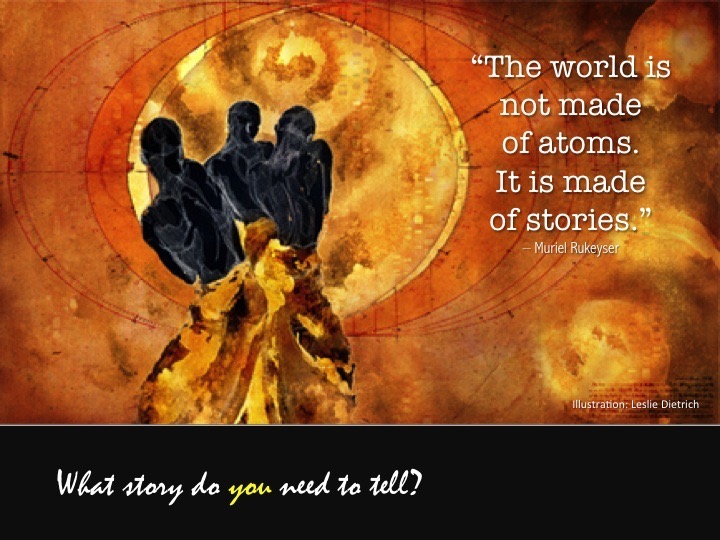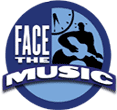Why I Wrote Storytelling at Work

In the past few weeks, quite a few people have asked me for the "elevator speech" about the book I wrote in 2015. I get it. These days, if you can't deliver your message in 60 seconds or less you're screwed. So here goes. Consider this my elevator speech (though the building you are riding in is a hundred stories high).
I wrote Storytelling at Work because I wanted to do everything in my power to unleash what I have come to realize is one of the biggest untapped resources on planet Earth -- and that is the collective insight and wisdom of human beings everywhere. No matter what our education, culture, or profession, each of us has a storehouse of brilliance inside of us -- a deep knowing (hiding in our stories) that, when expressed, has the power to uplift, inspire, and transform.
I'm not talking about the rote communication of book learning. Nor am I talking about the transmission of data, facts, and information. I'm talking about the communication of the very best of what human beings have to share with each other.

Look at it this way: If you want to transport water to a thirsty person, you need a container -- a cup, a bottle, or canteen. If you want to transport wisdom, you also need a container. And the best, most available, container we have is story.
This wisdom conveyance phenomenon has been going on since the beginning of time. It's how our species is wired. It started with cave paintings. It continued around the tribal fire. And it eventually found its way into the wisdom teachings of every civilization on earth.
In modern day business, this storytelling phenomenon has morphed into various, more commercialized forms, all considered to be ways of furthering an organization's success -- branding, advertising campaigns, leadership pep talks, and the sharing of "best practices."
Fine. No problem. But what I'm inviting people to share is not just new ways to sell products, convince others to work harder, or "continuously improve". I'm inviting people to dig deeper and share their "tacit knowledge" with each other -- the harder to express stuff about what they've really learned about themselves, life, and what it means to be a human being -- on or off the job. The juicy stuff. About adaptability. About resilience. About risk taking, courage, creativity, trust, failure, perseverance, passion, intuition, humor, commitment and whatever else they've experienced that is truly meaningful to them.
Without the expression of this wisdom, work can never be more than a job and life can never be more than thanking God for Friday.
Awesome quotes on storytelling
Why your brain likes a good story
Storytelling as a strategic business tool
Why my book matters + excerpts
The shortest elevator speech ever (book excerpt)
Posted by Mitch Ditkoff at 01:47 PM | Comments (0)
January 25, 2018ANONYMOUS REVEALED

I have a confession to make. Actually, it's more like a revelation than a confession.
You know all those fabulous quotes and articles you've read over the years with no attribution other than "Anonymous"? It was me. It's true. I have written thousands of things I've never signed my name to. I couldn't. I mean -- the writing just came through me. Like a storm. In fact, I was in such a state of presence as these pearls of wisdom appeared, there wasn't even a "me" involved, so how could I sign my name?
So I did the only thing I could do -- and that was to sign what I wrote with the now all-too-familiar word "Anonymous".
Please don't get me wrong. I'm not complaining, nor do I have any regrets about my selfless decision. It felt right at the time. But now, with the economy slowing down -- it's starting to make sense that I claim what is rightfully mine.
After countless hours of consultations with pundits, epistemological savants, numerologists, and intellectual property lawyers, I've arrived at an approach that is not only honorable and fair, but flawless and timely with absolutely no carbon footprint. Nor were any animals harmed in the writing of this paragraph.
I am pleased to announce that YOU, dear reader, get to play a key role going forward -- one that will take you less time than it will to order a take-out pizza.
Since I am claiming no royalties whatsoever from my past writings (many of which, by the way, went on to become blockbuster movies, novels, bumper stickers, and refrigerator magnets), I think it is only fair to request that every time you forward anything attributed to "Anonymous" you link it to this page -- a promo for my new online creativity course -- soon to be offered as a subscription service
My goal? To model what it's like to claim one's true inheritance and take the risk that this post will go viral and I will have to answer a lot of questions from slick talk show hosts more interested in their own TV ratings than my no longer anonymous success.
A small example of what I've never been paid for
Posted by Mitch Ditkoff at 09:37 PM | Comments (8)
22 Awesome Quotes on Revolution
My new book, STORYTELLING FOR THE REVOLUTION, will be published in May. The revolution I'm writing about is not a political revolution, its a revolution of the heart and, more specifically, how we communicate wisdom to each other. My weapon of choice is not a gun. It's a story. Actually, 40 stories. The quotes below speak to the spirit of where I'm coming from.
"You never change things by fighting the existing reality. To change something, build a new model that makes the existing model obsolete."- Buckminster Fuller
"A social movement that only moves people is merely a revolt. A movement that changes both people and institutions is a revolution." - Martin Luther King Jr
"The most important kind of freedom is to be what you really are. You trade in your reality for a role. You trade in your sense for an act. You give up your ability to feel, and in exchange, put on a mask. There can't be any large-scale revolution until there's a personal revolution, on an individual level. It's got to happen inside first." - Jim Morrison
"If I can't dance to it, it's not my revolution." - Emma Goldman
"Remember, remember always, that all of us, and you and I especially, are descended from immigrants and revolutionists." - Franklin D. Roosevelt
"Societies in decline have no use for visionaries." - Anais Nin
"Those who make peaceful revolution impossible will make violent revolution inevitable." - John F. Kennedy
"The Revolution introduced me to art, and in turn, art introduced me to the Revolution!" - Albert Einstein
"You cannot buy the revolution. You cannot make the revolution. You can only BE the revolution. It is in your spirit, or it is nowhere." - Ursula K. Le Guin
"The greatest challenge of the day is: how to bring about a revolution of the heart, a revolution which has to start with each one of us?" - Dorothy Day
"The greatest mistake of the movement has been trying to organize a sleeping people around specific goals. You have to wake the people up first, then you'll get action." - Malcolm X
"We have it in our power to begin the world over again." - Thomas Paine
"But I suppose the most revolutionary act one can engage in is to tell the truth." - Howard Zinn
"Revolution is not something fixed in ideology, nor is it something fashioned to a particular decade. It is a perpetual process embedded in the human spirit." - Abbie Hoffman
"A great revolution in just one single individual will help achieve a change in the destiny of a society and, further, will enable a change in the destiny of humankind." - Daisaku Ikeda
"Revolutions spring not from accident, but from necessity. A revolution is a return from the factitious to the real. It takes place because it must." - Victor Hugo
"If your regime is not strong enough to handle a joke, then you have no regime." - Jon Stewart
"He suddenly understood the message of so many spiritual teachers that the only revolution that can work is the inner transformation of every human being." - Stanislav Grof
"Revolution is the harmony of form and color and everything exists, and moves, under only one law: Life. Nobody is separate from anybody else. Nobody fights for himself. Everything is All and One. Anguish and pain, pleasure and death are no more than a process for existence. The revolutionary struggle in this process is a doorway open to intelligence." - Frida Khalo
"The most heroic word in all languages is revolution." - Eugene Debs
"Personal transformation can and does have global effects. As we go, so goes the world, for the world is us. The revolution that will save the world is ultimately a personal one." - Marianne Williamson
"Don't let it end like this. Tell them I said something." - Pancho Villa
Pre-order your book here
PHOTO: Sabine Schulte, Unsplash
Posted by Mitch Ditkoff at 07:30 PM | Comments (0)
January 23, 20185 Inexpensive Ways to Jump Start a Sustainable Culture of Innovation

Trying to create a culture of innovation is a daunting task for even the most committed organization. Cultures take decades to form. Changing them is not an overnight phenomenon, no matter how many outside consultants you've gotten on the case. You might as well try to end world hunger or wipe out Aids overnight. It's gonna take a while.
But if you and your colleagues are game, culture change is possible. The question, of course, is where to begin? Starting is always the hardest part. And, in the absence of clarity about where to start, procrastination creeps in -- and nothing changes.

OK. Enough preamble. Here are five ways to get started. Pick one or all five -- and don't forget to enjoy the process.
1. Name the Beast: If you want to change something, you will need to begin by understanding the current reality of that which you attempting to change. Make sense?
If you're getting into a new market, for example, you'd expect to do some competitive intelligence gathering, right? And if you've decided to parachute into Iran, it would make sense to do some diligence, before hand, no?
Same with the effort to foster a culture of innovation.
Get closer to the problem. Talk to people. Survey your workforce. Get everyone talking -- not just the C-Suite folks, but the people in the mail room, too.
Get off of the generic, politically correct stand that may be ruling the day and get down to the bones.
Then, when you make your case, more formally, you'll have some meaningful ground to stand on -- and the people listening will listen deeper than if you merely showed up one day with a few powerpoint slides, an anecdote from Google, and your newly expressed burning passion for the cause.
2. Set the Expectation: You get what you expect. That's the deal. Psychology experiment after psychology experiment has borne this out again and again.
You need a very strong intention to do this work and then you need to communicate it in a way that is compelling.
Your workforce needs to understand this is not the job of senior leadership, or HR, or R&D. It's everyone's job. Only when a critical mass of people in your organization embraces this effort will anything substantial happen.
If not, you will be wasting your breath -- and their time.
3. Define Innovation: Google "innovation" and you'll find thousands of definitions.
What do you mean by "innovation?" What is your definition? How do you want people thinking about it?
Is it incremental innovation? Disruptive innovation? Product innovation? Process innovation? Or is the whole thing really just a secret code for "cost cutting?"
Before anything significant can happen, you'll need to get aligned with your senior team about what, precisely, you mean by innovation -- and then communicate that, with some passion, to the workforce.

4. Frame the Challenges: OK. Let's say you want a sea change of innovation within your organization. Great. But in what specific domains? What are the specific challenges people can get their arms around and actually focus on?
As Charles F. Kettering once said, "A problem well-defined, is a problem half solved."
Towards that end, you and your team will need to dive in and start framing the problem. Not vaguely. Not generically. Very specifically. The clearer you are about communicating the domains in which you are asking people to innovate, the more results will show up.
The framing of the challenge, however, is not just your job. You'll need to invite others to get into the act.
If you've done your "name the beast" effort (see #1), this should be relatively easy.
5. Acknowledge What's Already Working: Lots of organizations who dive into the deep end of "culture change" have a tendency to get a sudden case of amnesia when it comes to their corporate history.
Inspired by the promise of the new, they forget to acknowledge the old -- paying precious little attention to what's already working well.
There are a ton of best practices already going on in your organization. There are many inspired "pockets of creativity" where turned-on-teams are doing exactly what they need to do to succeed.
The only thing is: very few people in the company know about this.
Everyone is so enmeshed in their own silos, that they have no clue what innovation-friendly behaviors are alive and well just down the hall -- behaviors they can learn from, adapt, and get rolling within their own spheres of influence.
Building on past successes will not only encourage people, it will guide their journey forward in ways that are empowering, uplifting, and real. And while you're at it, don't forget to routinely acknowledge current successes, as well -- the good things that happened today.
Thanks to Tim Gallwey for his refinement of #5.
Posted by Mitch Ditkoff at 02:58 PM | Comments (0)
January 22, 201824 Quotes on Good Communication

1. "The most important thing in communication is hearing what isn't said." - Peter Drucker
2. "The single biggest problem in communication is the illusion that it has taken place." - George Bernard Shaw
3."Think like a wise man but communicate in the language of the people." - William Butler Yeats
4. "We have two ears and one mouth so that we can listen twice as much as we speak." - Epictetus
5. "Speak when you are angry -- and you'll make the best speech you'll ever regret." - Laurence Peters
6. "In the last analysis, what we are communicates far more eloquently than anything we say or do." - Stephen Covey
7. "The most important things are the hardest to say, because words diminish them." - Stephen King
8. "Of all of our inventions for mass communication, pictures still speak the most universally understood language." - Walt Disney
9. "Good communication is as stimulating as black coffee, and just as hard to sleep after." - Anne Morrow Lindbergh
10. "The two words information and communication are often used interchangeably, but they signify quite different things. Information is giving out; communication is getting through." - Sydney Harris
11. "Communication leads to community, that is, to understanding, intimacy and mutual valuing." - Rollo May
12. "Humor is the affectionate communication of insight." - Leo Rosten
13. "Science may never come up with a better office communication system than the coffee break." - Earl Wilson
14. "Communication is everyone's panacea for everything." - Tom Peters
15. "Two monologues do not make a dialogue." - Jeff Daly
16. "Wise men talk because they have something to say; fools, because they have to say something." - Plato
17. "Be still when you have nothing to say; when genuine passion moves you, say what you've got to say, and say it hot." - D.H. Lawrence
18. "Any problem, big or small, within a family, always seems to start with bad communication. Someone isn't listening." - Emma Thompson
19. "When people talk, listen completely. Most people never listen." - Ernest Hemingway
20. "You cannot truly listen to anyone and do anything else at the same time." - Scott Peck
21. "The difference between the right word and the almost right word is the difference between lightning and a lightning bug." - Mark Twain
22. "That which we are capable of feeling, we are capable of saying." - Cervantes
23. "I have an answering machine in my car. It says, 'I'm home now. But leave a message and I'll call when I'm out.'" - Steven Wright
24. "Give me the gift of a listening heart." - King Solomon
Idea Champions
Thanks to Val Vadeboncoeur for locating a bunch of these
Posted by Mitch Ditkoff at 09:01 PM | Comments (1)
The Best of My Huffington Post Articles on Storytelling
You may not know this, but I have been a Huffington Post blogger for the past five years. During that time, I've published a number of well-received articles on storytelling, with a special focus on storytelling in the workplace. Below are links to some of them. Each one will take you less than four minutes to read unless you are multi-tracking, catotonic, or heavily sedated.
Why Create a Culture of Storytelling?
The Art of Using Story to Communicate Big Ideas
The Secret Code of Tacit Knowledge
Storytelling is the Trojan Horse of Wisdom
Why Tell Stories?
How to Tell a Good Story
What Kind of Stories Will You Tell Today?
The Power of Personal Storytelling
The book these are excerpted from
Posted by Mitch Ditkoff at 04:36 PM | Comments (0)
January 21, 2018The Six Sigma Blues from a Lean Six Sigma Perspective

One of my favorite clients of all time was a key manager in a prominent Fortune 500 company.
She was smart. She was funny. She was creative. And she was kind.
Then her company adopted Six Sigma.
I couldn't help but notice that soon after this she started becoming very cranky, not unlike the way an artist gets upon filling out a tax form.
When I asked her how the Six Sigma initiative was going, she rolled her eyes and mumbled something about "going through the motions."
In a lucid online Business Week posting, Brian Hindo deconstructs some of the flawed assumptions of the Six Sigma approach.
"The very factors that make Six Sigma effective in one context," explains Hindo, "can make it ineffective in another. Traditionally, it uses rigorous statistical analysis to produce unambiguous data that help produce better quality, lower costs, and more efficiency. That all sounds great when you know what outcomes you'd like to control. But what about when there are few facts to go on -- or you don't even know the nature of the problem you're trying to define?
"New things look very bad on this scale," says MIT Sloan School of Management professor Eric von Hippel, who has worked with 3M on innovation projects that he says 'took a backseat' once Six Sigma settled in.
"The more you hardwire a company on total quality management, the more it is going to hurt breakthrough innovation," adds Vijay Govindarajan, a management professor at Dartmouth's Tuck School of Business. "The mindset that is needed, the capabilities that are needed, the metrics that are needed, the whole culture that is needed for discontinuous innovation, are fundamentally different."
And so, dear Heart of Innovation readers, in honor of all people who have ever questioned the long-term value of Six Sigma... in honor of all the people who have understood that increasing -- not decreasing -- variability is often the key to success, it is my utmost pleasure to make my graceful exit from this latest blog posting with the immortal, finger-snapping, toe-tapping, knee-slapping, put-on-your-blues-hat-and-sunglasses lyrics to....
THE GOTTA HAVE A PROCESS BLUES
I woke up this morning,
put both feet on the floor,
but I didn't have a process
to find the bathroom door,
so all I did was shuffle,
first the left foot, then the right,
forgot to count the tiles,
(hey boss, I ain't too bright.)
We got green belts, black belts,
corporate karate,
and soon we'll need a process
for going to the potty.
Lord, I need a chart and graph to help me choose
just what to name this song about the Six Sigma blues.
Back when we were kids
the only processed thing was cheese,
now we need a process
every single time we sneeze,
I say "achoo," I blow my nose,
I try to get it right,
my Black Belt says my charts don't flow,
not once a gesundheit.
I make no mistakes,
I do everything right --
to make sure nothing breaks,
I stay up all night,
I'm a Six Sigma cowboy
cutting cycle time in half,
I measure every joke
and the way it makes me laugh.
We got green belts, black belts,
corporate karate,
and soon we'll need a process
for going to the potty,
a fishbone diagram would be so cool to help me choose
just what to name this song about the Six Sigma blues.
I barely make a boo boo, I rarely blow a deal,
you might call it voo doo, but that's just how I feel,
I'm one in a million
though my defects number three,
I log on while I'm sleeping
and I've changed my name to "E."
We got green belts, black belts,
corporate karate,
and soon we'll need a process
for going to the potty.
-- Blind Willy Nilly (aka "Mitch Ditkoff")
Looking for an alternative to Six Sigma -- a more creative, human, but very process-oriented approach to problem solving? Check out Go Lean Six Sigma
Idea Champions
Our clients
What our clients say about us
Posted by Mitch Ditkoff at 01:48 PM | Comments (0)
January 20, 2018A DIFFERENT KIND OF WAY TO CLOSE A SALE

Anyone who owns a business, whether they've been to business school or not, knows one thing: You need customers. No customers, no business. How you get customers, of course, is the question.
In my business, one of the main ways to get business is responding to RFPs -- requests for proposals. Here's how it works: a company hears about you, checks out your website, contacts you, schedules a call, tries to figure out if you're the real deal and, if you pass their sniff test, asks you to submit a proposal.
In the beginning of my career, I would get very excited whenever anyone asked me to submit an RFP. It meant I had a big one on the line, a horse in the race, my hat in the ring, or whatever other metaphor I could conjure up to reinforce my belief that I was actually going to make a living. Like a beanie wearing college freshman, I dove into the proposal writing process with great zeal.
In time, however, responding to RFPs made me cranky. I came to learn that only one in ten proposals would make the grade and that the other nine, which I had so diligently crafted, were merely my response to bogus fishing expeditions from the client. Either they had already decided on their vendor, were testing the waters, wanted to get free insights, or were merely on the hunt for the low cost provider.

So when MTV Networks called, I was betwixt and between. Do I play the game and spend the better part of my day writing a proposal or do walk my talk and do something different?
Since I'd already done some work for MTV, I decided the time was right to experiment, so I asked myself a question: "How can I radically reduce the time it takes me to write a proposal that gets results?" The answer came quickly -- the TWO WORD proposal. In 200 point type, I wrote the words "TRUST US" with an asterisk after the "S" -- and, at the bottom of the page, in 8 point type, noted our fee. That was it. Two words and a bottom line.
On the day my proposal was due, I walked into the office of MTV's CFO, Jim Shaw. After the ritual chit chat and cup of coffee, he asked me if I had the proposal.
"Yes, I do, Jim. But first let me ask you a question. 'Do you get a lot of proposals?'"
He laughed, pointing to a huge stack on his desk.
"And do you like reading proposals?"
Jim looked at me as if I had asked him to stick forks in his eyes.
"Good!" I said. "Then there's a good chance you will love my proposal. But in order to give it to you, I need to get further away from you."
And with that warning, I began backing away across the room. When I got as far away as possible, I stopped and held my proposal in the air.
Even from across the room, Jim could read my two words: TRUST US! Smiling, he beckoned me forward, took the proposal from my hands, lowered his eyes to the bottom line, and extended his hand.
"You got a deal," he said.
Two words in big bold type and a bottom line. That's all it took. Two minutes. Not two hours.
FOR YOUR REFLECTION: "We have 60,000 thoughts per day," said Deepak Chopra. "Unfortunately, all of them are ones we had the day before." That's how most human beings roll. Creatures of habit, we find a groove and stay in it until it becomes a rut. Then it's so deep, we have a hard time getting out of it, so we decorate our walls with Dilbert cartoons and pictures of our last vacation.
Sometimes, we need to do something different. Will this "something different" work every time? No, it won't. But it will work sometimes. My two-word proposal was the perfect thing for MTV. It wouldn't have been the perfect thing for a new client or the IRS, but for MTV it got the job done.
NOW WHAT? Think of a proposal, pitch, or presentation you need to make in the next few weeks. On one side of a piece of paper, write down all the reasonable things you can do to get the gig. Then, on the flip side, write down all the unreasonable things -- new approaches, new ideas, and new ways to make your case. After you write your first wave of unreasonable approaches, write your second wave. Then pick one of them and go for it. Inspiration for you.
Excerpted from Storytelling at Work.
Idea Champions
Mitch Ditkoff
Posted by Mitch Ditkoff at 12:13 PM | Comments (0)
January 15, 2018The Creative Personality

Here's an informative and inspiring article on the creative personality by the lifelong creativity researcher, renowned author of Flow (and the man with the hardest last name to pronounce in the world) -- Mihaly Csikzentmihalyi.
The aforementioned Professor C. offers deep insights into the complex and often polarized personality of creative people. Recognize yourself in any of his descriptions?
Awake at the Wheel
The Creative Mind Keynote
Illustration
Posted by Mitch Ditkoff at 03:42 PM | Comments (0)
January 06, 20185 Ways to Raise the Bar for Storytelling in Your Organization

If your organization is looking for an engaging, flexible, cost-effective way to raise the bar for storytelling in the workplace, I'm your man. Below are five ways I can help you stir the storytelling soup:
1. WORKSHOPS
- Creating the Innovation Mindset
- Storytelling at Work
2. KEYNOTES:
- Scroll down to the third keynote
3. WISDOM CIRCLES
- Small group storytelling gatherings
- Train the Trainer also available
4. MICRO-LEARNING:
- Short blasts of online innovation-sparking content,
- A yearlong curriculum of my original content (52 links)
- Can be focused on storytelling or include 11 other topics
- Learn more
5. MY STORYTELLING BOOKS
- Storytelling at Work (bulk discounts available)
- Storytelling for the Revolution (to be published in May)
MitchDitkoff.com
My clients
Posted by Mitch Ditkoff at 01:02 PM | Comments (0)














